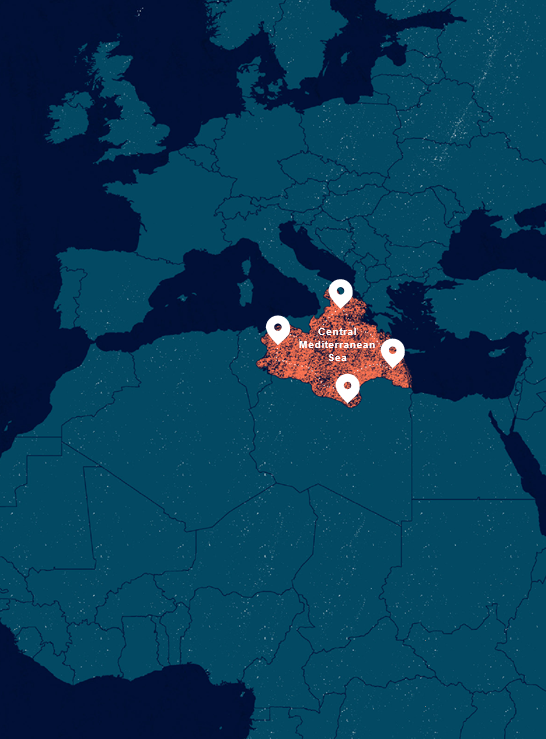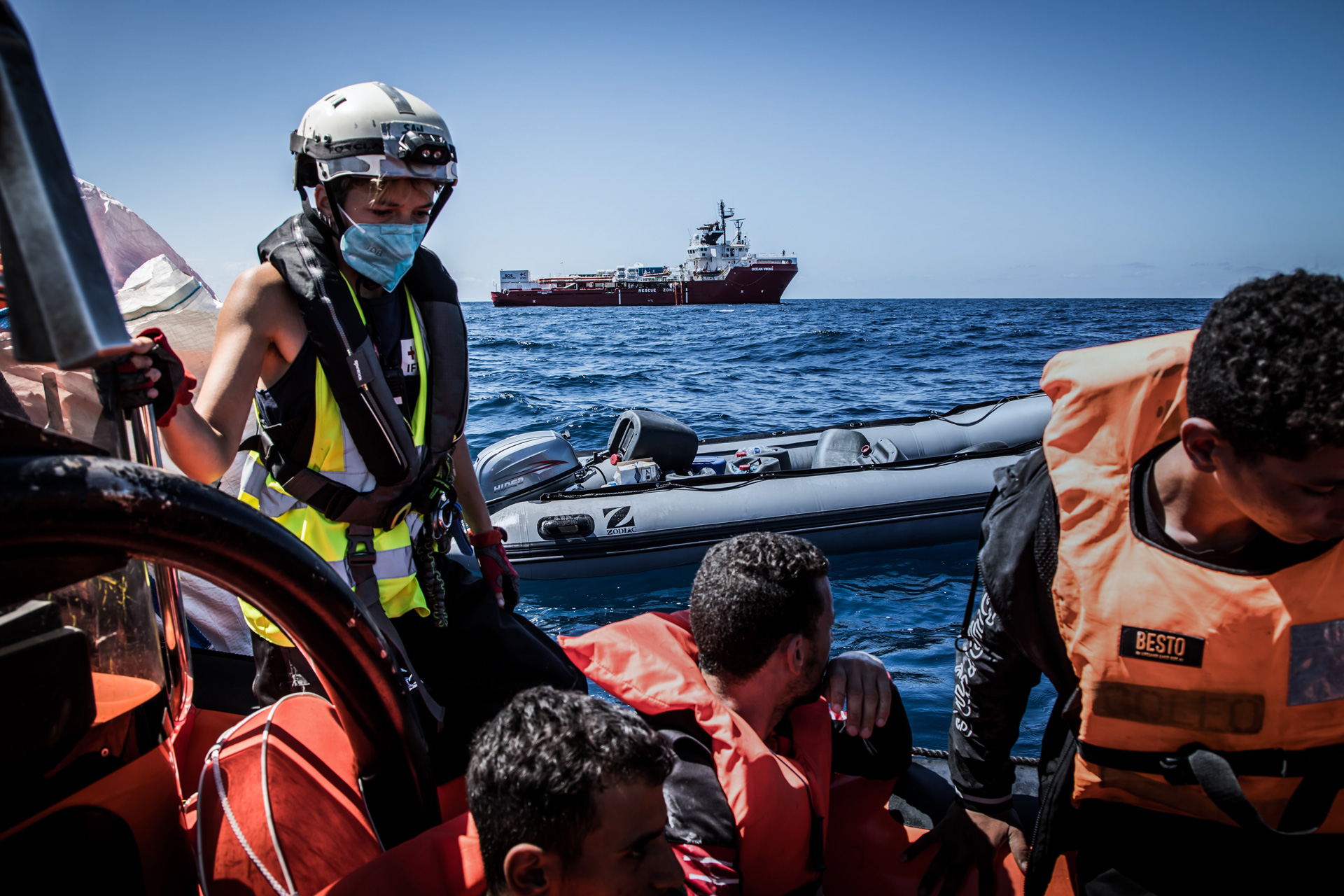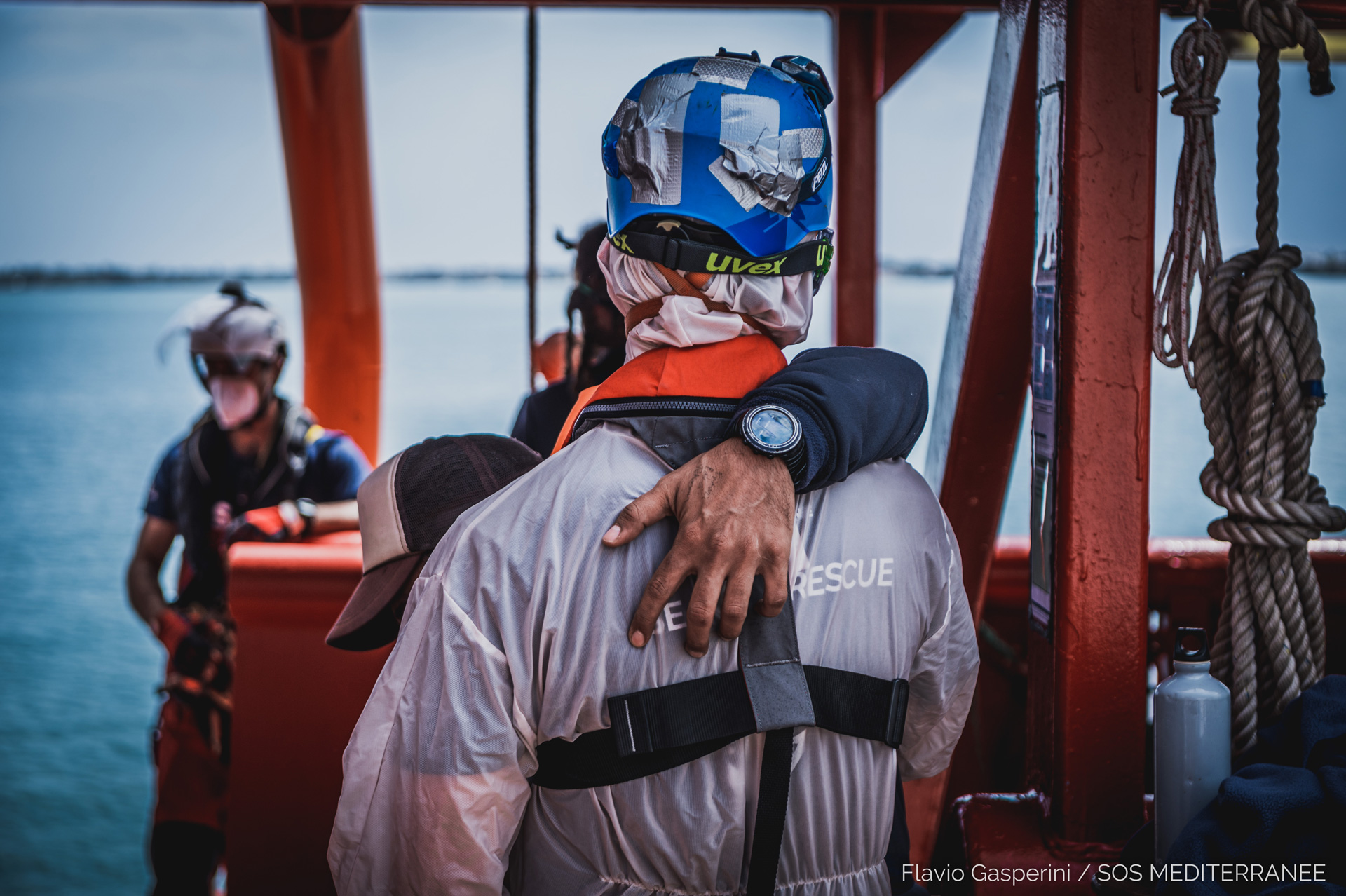HSP Case Study: Mediterranean Sea
Mediterranean Sea
Mobile Humanitarian Service Point
Central Mediterranean Sea
2021
- Migrants and displaced persons
- Healthcare (including first aid, maternal healthcare and psychosocial support)
- Food
- Non-food items
- Water, sanitation and hygiene (WASH)
- Vulnerability assessments
- Safe referrals
- Restoring family links
- Well-being activities (e.g., yoga, music, dance)
- Child-friendly space and safe space for women
The Central Mediterranean Sea is the deadliest known migration route in the world, with more than 20,000 lives lost between 2014 and 2022. This is due both to the length of the journey across the sea, which can take days, as well as dangerous people smuggling patterns, gaps in search and rescue operations and restriction and obstruction of the lifesaving work of NGOs. Migrants and displaced persons often cross the Central Mediterranean in unseaworthy, overloaded inflatable boats. As the COVID-19 pandemic slowed and mobility restrictions were lifted, a growing number of sea crossings were reported and are expected to continue. Although the number of people departing from Tunisia significantly increased between 2018 and 2021, Libya remains the main country of departure for people travelling by sea to Italy, accounting for over half of all sea arrivals registered in Italy in the first nine months of 2022.
In 2022, the most common countries of origin for sea arrivals to Italy included Egypt, Côte d’Ivoire, Guinea, Pakistan and Tunisia. On their journeys to Europe, migrants and displaced persons are exposed to human rights violations, human trafficking, violence, slavery, forced labour, abuse and exploitation. In Libya, non-Libyan nationals face severe protection risks, including torture, sexual and gender-based violence in detention centres, as well as discrimination and violence when entering, staying and exiting the country. Women, children and older people are especially at risk as they embark on these dangerous journeys. The protection risks add to the traumatic experience of crossing the Mediterranean in overcrowded and unseaworthy boats.
The search and rescue NGO, SOS Méditerranée, was founded in 2015 and has since rescued over 37,000 people in distress in the Central Mediterranean. In early 2021, SOS Méditerranée approached the IFRC and proposed entering into a partnership with the goal of complementing its search and rescue operations with post-rescue assistance and relief on board the Ocean Viking ship. Since no individual National Red Cross or Red Crescent Society has a clear mandate in international waters, the IFRC agreed to step in as the implementing partner, on behalf of the wider International Red Cross and Red Crescent Movement. The partnership began in August 2021, on the basis that the IFRC would implement an ‘HSP at sea’ (HSP@Sea) to provide relief, health and protection services to people rescued in the Central Mediterranean. On and offshore, 16 National Red Cross and Red Crescent Societies have been involved in supporting the implementation of the HSP@Sea until the end of April 2023 (Participating National Red Cross and Red Crescent Societies include those from Australia, Austria, Belgium, Canada, Denmark, Finland, France, Iceland, Italy, Hong Kong, Kuwait, Monaco, the Netherlands, Sweden, the UK and the USA).
“I didn’t plan to go to Europe when I left my country. I just had to escape, and in Libya I had to escape again. The sea was the only way out. I was afraid for my children when I saw the boat. But I had no other choice. It was very hot on the boat. I didn’t have enough water or food. My children were crying. We were all so tired. But then [the Ocean Viking] came. Every morning my daughter massages my back to ease the pain with her little hands and I pour hot water on my aching stomach and back. And now, on the Ocean Viking, I am being cared for by a midwife for the first time in my life.”
A survivor from Guinea
Depending on National Society availabilities at each rotation, the IFRC post-rescue team on board the ship is usually composed of a team leader, cultural facilitator, doctor, nurse and midwife, alongside relief, protection and communications delegates. The first part of every rotation is dedicated to training and preparation for different scenarios. On board the Ocean Viking, post-rescue assistance includes health and mental health services (including maternal healthcare, medical and psychosocial first aid), provision of food and non-food items, well-being activities to reduce stress and harmful behaviours (for example dance, music and yoga sessions), restoring family links services (including the ‘Salamat’ safe and well message service), and information sessions (covering topics that include protection mechanisms and Italy’s asylum system). Between August 2021 and April 2023, the IFRC and participating National Red Cross and Red Crescent Societies took part in 13 rotations on board the Ocean Viking, during which 3,567 people (including 1,115 minors) were rescued.
According to a participating Red Cross National Society staff member, if survivors did not benefit from the services provided by the HSP at sea, “they would have much longer-term injuries.” In their view, the presence of Red Cross and Red Crescent actors on board makes a big difference. In particular, psychosocial support is seen to “help them come back to their regular life.”
“Our presence makes people feel safe after a dangerous journey. They feel they can trust us, can share their story with us and they know that there will be a follow up. It is not only about basic needs such
as shelter or food, but our job is also mainly about restoring their dignity, safety and well-being, putting them at the centre of any action and activity.”IFRC Post-Rescue Team Leader
Red Cross and Red Crescent insights
Stranded at sea for 21 days
Between 22 October and 10 November 2022, 234 women, men and children rescued by the Ocean Viking were stuck in limbo, waiting to disembark to a port of safety. Rescued people were exhausted, dehydrated, in psychological distress and some required immediate medical attention.
“A safe place was found thanks to the collective efforts of IFRC, National Societies and SOS MED”.
IFRC, Protection Analysis Report, HSP@SEA, October 2022
The IFRC and National Red Cross and Red Crescent Societies engage in humanitarian diplomacy at both operational and policy levels to address issues affecting the HSP@Sea operation in the Central Mediterranean. Key issues include non-refoulement, safe and predictable disembarkation, safe pathways to international protection and non-criminalization of humanitarian assistance to migrants and displaced persons in an irregular situation. With support from the IFRC and the Red Cross EU Office, national advocacy is carried out by National Red Cross and Red Crescent Societies, whose auxiliary role to their respective governments means they are well placed to engage with the relevant authorities. The IFRC guides this work with a comprehensive advocacy strategy that underpins the operation and includes key messaging and various means of engaging with key stakeholders at national, regional and global levels.
During the 21 days of limbo, the IFRC and National Red Cross and Red Crescent Societies worked tirelessly to find a solution for survivors to safely disembark. The very long delay endured by survivors on board led to a joint SOS Méditerranée and IFRC press release calling for maritime law to be respected. According to an IFRC staff member, when it comes to humanitarian diplomacy, “perseverance is key”, as is placing the voices of migrants and displaced persons at the centre of advocacy efforts (while protecting the personal data of survivors). Despite a very difficult legal and policy context in the Mediterranean, she explained how “encouraging and spiriting [it was] to see our Movement come together to advocate during the 21-day stand-off.” A place of safety was finally found, and all survivors disembarked in Toulon, France, where the French Red Cross provided assistance and protection.



